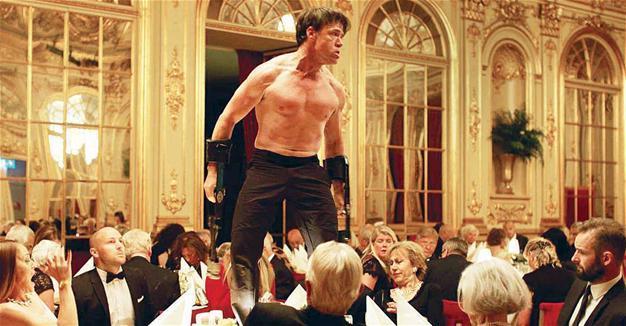An endless search for love at Cannes
VECDİ SAYAR – CANNES
 In our first review we spoke about two films at Cannes this year (“Sea Sorrow” and “Jupiter’s Moon”) focusing on one of the main themes of this year’s festival: The migration crisis. This is only part of the overall crisis in today’s Europe, which includes the degeneration of the political and economic system as well as of human values. Filmmakers at Cannes largely concentrate on these issues; some in a realistic manner and some searching for metaphorical and allegorical styles.
In our first review we spoke about two films at Cannes this year (“Sea Sorrow” and “Jupiter’s Moon”) focusing on one of the main themes of this year’s festival: The migration crisis. This is only part of the overall crisis in today’s Europe, which includes the degeneration of the political and economic system as well as of human values. Filmmakers at Cannes largely concentrate on these issues; some in a realistic manner and some searching for metaphorical and allegorical styles. “Happy End” of director Michael Haneke, already a winner of two Golden Palms, is among the best titles of this year’s competition. Haneke depicts the corruption and disintegration of bourgeois society, with this masterfully crafted movie taking in themes of class relations, the migration crisis, loss of human contact, and high technology with humor. The acting of Jean-Louis Trintignant, Isabelle Huppert, Mathieu Kassovitz among others is wonderful and the camera work is impressive.
Similar themes are addressed in “Loveless,” one of my favorites this year. Russian director Andrey Zvyagintsev draws a realistic portrait of a middle-class family in crisis. The film examines abusive behavior between the members of the family, as well as pathologies of a socio-political system, in a realistic style.
Swedish director Ruben Oslund’s “The Square” is another accomplished critique of contemporary society, with an imaginative and humoristic/satirical touch. He examines the nature of relationships in society, as well as the contemporary art world and PR industry. Immigrants also appear in this film, forcing us to question our sincerity in moral issues and our responsibilities.
Another film focusing on human relations is “The Killing of a Sacred Deer.” An Irish production, directed by Greek director Yorgos Lathimos, the film takes an imaginative approach based on Greek mythology. A father is asked to “sacrifice” one of the members of his family for a deed he has done, (the main protagonist is a heart surgeon and he is blamed for the death of a patient during operation). The film has a similar style with the Hungarian film “Jupiter’s Moon,” using metaphors to exceed the boundaries of reality.
Sincerity and humor
Nearly all films in competition emphasize the lack of love in human relations, but they try to avoid cheap sentimentality. One of the best realistic love stories comes from South Korea. Director Hong Sangsoo explores the relationship between the boss of a publishing company, his wife, his ex-lover and a young and beautiful newcomer in “The Day After.” The film has a sensitive approach for all its characters and touches them with humor.
Another film focusing on the theme of the search for love is “Redoubtable” by Michel Hazanivicius. This time the story unfolds on a real character, the legendary French New Wave director Jean-Luc Godard and his lover/actress Anne Wiazemsky. Hazanivicius presents the events of the year of revolt, 1968, as the background of the love-story, and creates a humorous critique of the renowned director as well as the story of a generation. Though totally rejected by many critics, this is a likeable and sincere film, but it is unlikely to get a prize (it is also said that Godard himself has seen the film and hates it).
Another entertaining picture, with ecological and anti-capitalistic themes, is a love story between a child and a super-pig (an example of a new generation with altered DNA), “Okja” by South Korean director Bong Joon Ho. It also has little chance of an award, since the jury president Pedro Almodovar has openly stated that a film produced for a digital platform (Netflix) without a theatrical release should not be competing in Cannes. But still it is a charming and imaginative piece.
“Rodin” is another love story, told in a classical style, in which Jacques Doillon comments on the well-known relationship of August Rodin and his apprentice-turned-lover Camille Claudel from a totally new point of view. His Rodin, played masterfully by Vincent London, is drawn in such a precision and sincerity that, despite his treachery to his wife, we like him and we follow the story through his point of view, thus avoiding the politically correct approach of seeing Camille as the victim of a monster artist!
In “Radiance,” Japanese director Naomi Kawase looks into the world of visually impaired people through the relationship of a young woman who writes film audio descriptions and a partially-sighted photographer. It is a beautiful picture, emphasizing the lack of “beauty” in our everyday lives.
Robin Campillo’s “Beats Per Minute,” mostly due to its political engagement, is a favorite film for many critics. The film is a gay love story, with a backdrop of post-1989 activism in the “Act Up” community in Paris. It is not a great film in my opinion, but it has a chance of getting a prize due to its content.
The screenings have not yet finished, but at this point we can say that this year’s line-up is OK (not as strong as it has been in the past). Artistic director Thierry Fremaux has largely opted for films tackling personal rather than political issues, leaving some of the most direct political films to the sections “Un Certain Regard’ and “Special Screenings.”
















